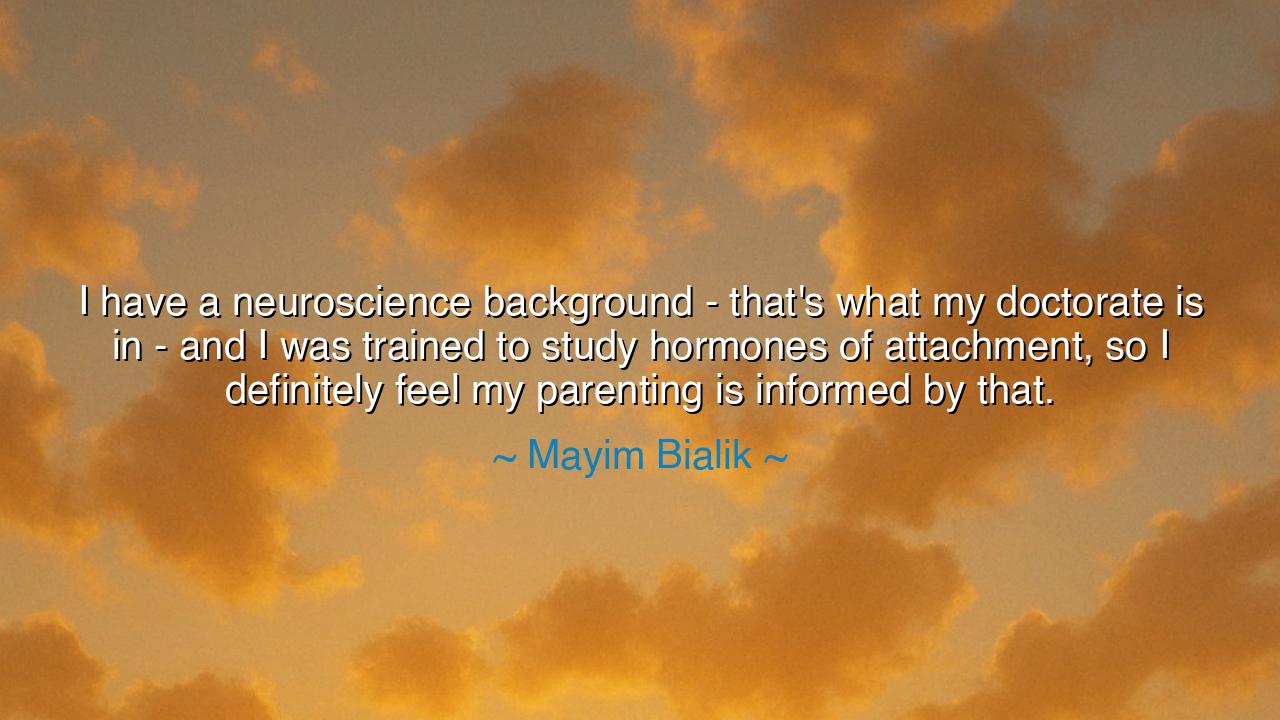
I have a neuroscience background - that's what my doctorate is
I have a neuroscience background - that's what my doctorate is in - and I was trained to study hormones of attachment, so I definitely feel my parenting is informed by that.






Mayim Bialik, both scholar and mother, once spoke words that bridge the worlds of science and the sacred work of the home: “I have a neuroscience background—that’s what my doctorate is in—and I was trained to study hormones of attachment, so I definitely feel my parenting is informed by that.” In this statement lies a rare fusion of knowledge and devotion. She proclaims that raising children is not a matter of instinct alone, nor science alone, but a union of the two, where the wisdom of the mind strengthens the compassion of the heart.
At the heart of her words stands the truth that attachment is not an abstract philosophy, but a reality woven into the body and soul of both parent and child. The hormones of attachment, studied under the careful eyes of science, are nature’s way of binding lives together. They whisper in the brain, urging parents to nurture, comfort, and remain present. Bialik reminds us that to understand this is to see parenting not as a task of control, but as a sacred dance of connection, written in both blood and spirit.
History itself offers confirmation of this truth. Consider the work of Konrad Lorenz, who studied the imprinting of ducklings and showed the world that even animals carry within them a deep biological pull toward connection. Yet even before science revealed this, ancient cultures knew it in practice. Mothers in every age have carried their infants close, sung lullabies through the night, and held the young to their hearts. Whether described in the language of oxytocin or in the poetry of the ancients, the truth remains: the bond of parent and child is both natural law and divine mystery.
Bialik’s reflection also reveals her humility. Though she holds a doctorate and knowledge of the human brain, she does not wield science as a weapon of superiority. Instead, she uses it as a lantern to guide her own parenting, to remind herself that children are not experiments, but beings who thrive when the bond of love is secure. Her words are a testimony that wisdom is greatest when it is not separated from compassion, and that true learning serves life rather than lording over it.
The power of her teaching is also heroic. For in an age where society often fragments the family, Bialik dares to remind us that the science of attachment is not luxury but necessity. To parent with presence, to respond to cries, to build closeness, is not spoiling but strengthening. The body itself testifies that connection is health, and disconnection is harm. To ignore this is to walk against the very design of life itself.
The lesson for future generations is clear: let knowledge serve love. Seek wisdom in science, but do not separate it from the wisdom of the heart. Parents may not all hold degrees in neuroscience, but all can learn from what science confirms—that children thrive in closeness, security, and trust. Practical actions arise from this: hold your children often, listen to them, let your presence be consistent. Trust that in meeting their needs for attachment, you are not weakening them, but preparing them to face the world with strength.
Therefore, let Mayim Bialik’s words be remembered as a teaching of balance: that the union of knowledge and nurture forms the strongest foundation for parenting. Let future mothers and fathers know that to study the mind is good, but to embrace the heart is greater—and together, they create a wholeness that neither could achieve alone.
Thus, her voice becomes a timeless scroll of wisdom: that in the raising of children, the most profound truths are those written both in the language of science and in the language of love. To follow this path is to parent with clarity, humility, and devotion, shaping not only the lives of our children, but the very fabric of generations to come.






AAdministratorAdministrator
Welcome, honored guests. Please leave a comment, we will respond soon